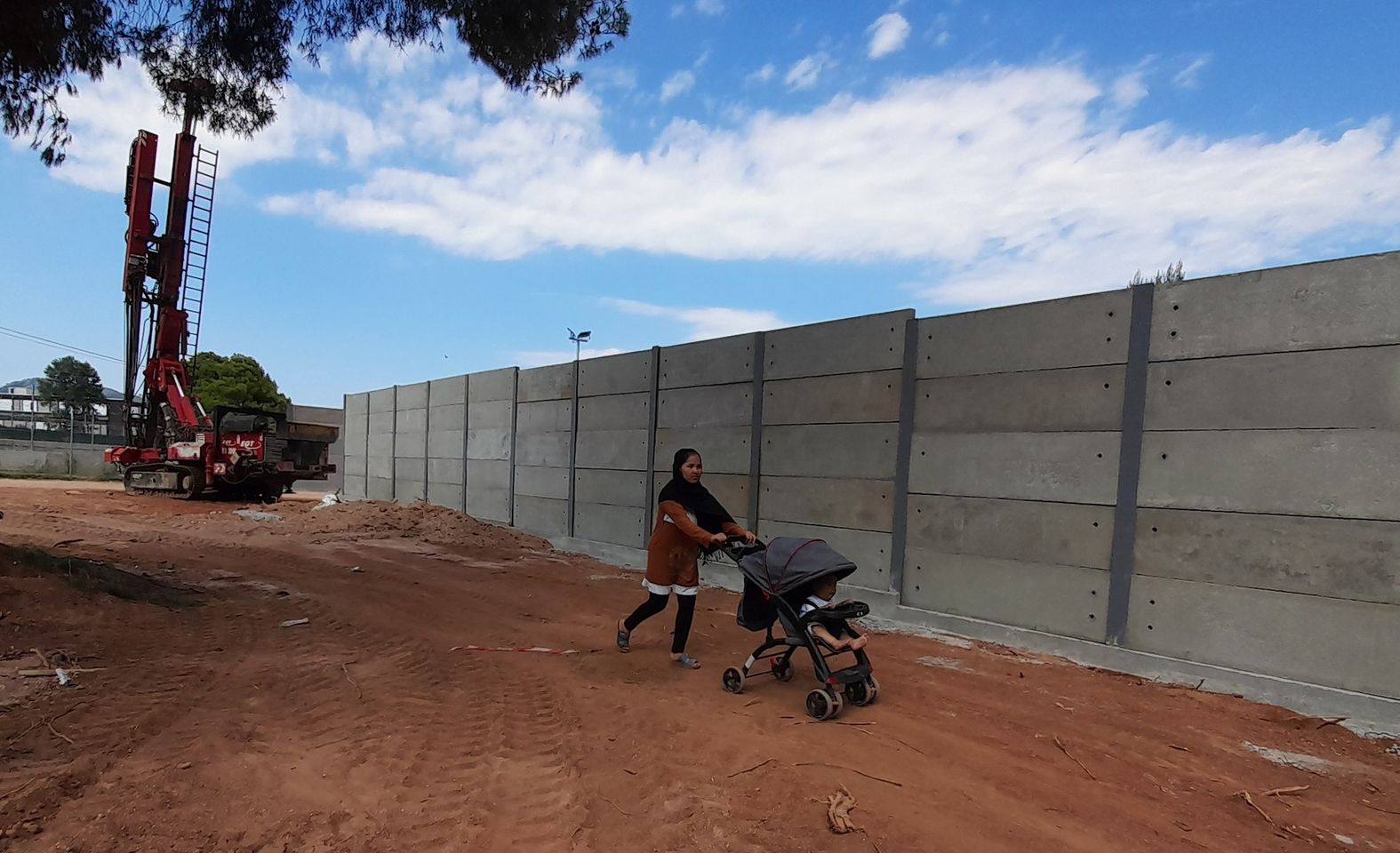Photo: The wall construction of the Ritsona refugee camp. Summer 2021. Photo by myself.
In recent years, Greece has seen a reconfiguration of its migrant concentration camps, with new camps being erected on islands and existing camps being converted into “closed controlled centers” surrounded by walls. These military-style camps are part of a broader racist-colonial system operating within Greece and throughout Europe.
According to a report by the United Nations High Commissioner for Refugees (UNHCR), Greece is not complying with international laws and standards regarding detention conditions, access to asylum procedures, and the right to effective remedy. The UNHCR’s report also highlights the dire living conditions of the migrants in these camps, with overcrowding, lack of proper sanitation, and inadequate healthcare.
The construction and expansion of these camps are being carried out by companies such as TERNA and MYTILINEOS, who are profiting from the “schizophrenic response” of European states to the crisis.
Among the manifestations of this schizophrenia is the repeated invocation of the trope of “crisis” in relation to asylum seekers. The “refugee crisis” that dominated European political attention in 2015–2016 was a particularly intense manifestation of the moral panic that has surrounded asylum and immigration more generally for decades. Politicians and the media often use fluvial or animal metaphors to describe this “crisis”, such as comparing the arrival of asylum seekers to a “flood”, “tide”, “torrent”, or “wave” that threatens to swamp the recipient society, or to a “stampede”, “flock”, or “swarm” with a similar potential to overwhelm the country.
In the general view of Greek and EU authorities, controlled close camps or, more specifically on my side, imprisonment has become the response of first resort to far too people who are ensconced in refugee management crisis and racism. As a result of poor camp conditions, and the resulting harms and violence, migrants are framed as dangerous and deviant, as undesirable, and as risky instead of at risk. It is masked by being conveniently grouped together under the category “illegal immigrants” or “asylum seekers” and by automatically classifying people as criminals. Homelessness, unemployment, drug addiction, mental illness, and illiteracy are only a few of the problems that disappear from public view when the human beings contending with them are relegated to cages.
The Greek government, along with the European Union, have hailed these camps as a symbol of “strict, but fair” immigration policies. However, the reality is that these camps are dystopian detention centers where the daily lives of refugees and asylum seekers are tightly controlled and monitored. The YPERION system subjects migrants to humiliating and dehumanizing procedures, such as standing with arms and legs spread open and undergoing hand-held scanners used in flight control.
These concentration camps are located near areas where immigrants, women, and Roma work in factories, crafts, and warehouses, producing over 30% of the Greek GDP. The fascist Mayor of Aspropyrgos, in collaboration with Hellenic Petroleum, even excludes migrants and Greek, Albanian, and Roma people from social programs “for Greeks only.” The construction industry’s fingerprints are all over this crime against humanity.
The harm suffered by refugees trapped in camps is instrumental to neoliberal governance. Humanitarian actors who provide aid and assistance to camp residents are actually contributing to their continuation by sustaining the camps. While the left has been quick to condemn these illiberal practices, it has often failed to take into account the political economy of camp systems.
Despite the efforts of local movements, refugees continue to face numerous obstacles in their struggle for basic rights such as residency documents and asylum. Even when these issues are addressed, the class and social position of refugees are often overlooked, reducing them to identical individuals without characteristics or identity. The slogan of defending the right to asylum for “everyone” becomes an abstraction that is rarely translated into practical actions to support refugee movements.
In the context of the refugee camp, the needs and demands of refugees for basic rights and faster asylum procedures are often ignored in favor of opposition parties’ criticism of the ruling party’s performance, urban planning, and gentrification. The interests and needs of “others” are not being taken into account, but the struggle for refugee rights has been seen as part of an opposition political struggle.
The silence surrounding the concentration camps is deafening. The Greek State, European Union, and businesses are complicit in maintaining the systemic oppression of immigrants and marginalized groups. The racist-colonial system built by European governments, directed by the EU and with the agreement of Turkey, remains standing and is becoming more invisible as it hardens and shields itself, sometimes with a “human face.”








